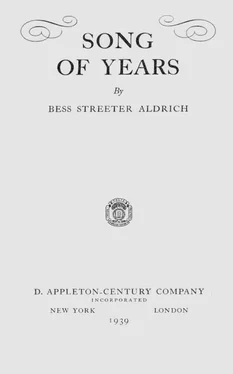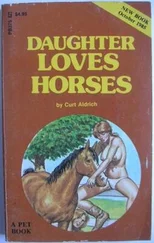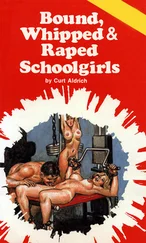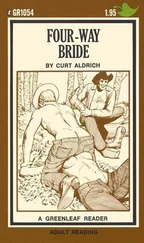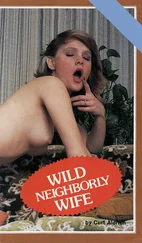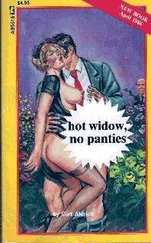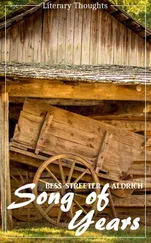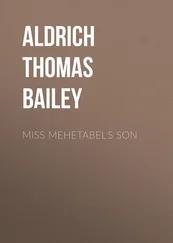The two young women in the doorway came on down to the log stoop. The young girl with the pan emerged in her entirety from around the corner. Heads were hurriedly withdrawn from the loft windows so that he had a definite intuition the group of femininity in front of him was about to be enlarged.
In that he was quite right. For one fleeting moment he was under the impression that a couple of dozen girls had descended upon him. In reality seven had arrived around the log stoop with much laughter and swishing of full calico dresses. One of the number was holding onto something dangling at the bottom of her skirt. The last two comers were laughing themselves sick over this just recently ripped braid, so that the first of the group, although not knowing what it was all about, joined in merrily, apparently from sheer sympathy of infectious risibilities. There was almost wild commotion, with the great dogs leaping and barking and seven girls emitting laughter in various keys and degrees of volume.
Wayne faced them, unflinching, as he would have done any other brave thing, meeting wolves on the trail, unfriendly Indians, a striking rattler. He had his cap off and the rays of the sinking sun touched his light hair with flecks of bronze. He looked very stalwart and manly standing there in his woodsman’s clothes, his arms folded across his cap. Unconsciously he had his eyes on the young Suzanne, grinning cheerfully at him, who, in all this hubbub of strangers, seemed like a tried and true friend of long standing.
They were closing in on him and at least three of the girls were saying: “You’re the new neighbor?”
“Yes.”
“We knew it,” from four. And he had thought girls out on the raw prairie like this would be shy, backward.
“Pa said . . .”
“He told us you’d bought land and . . .”
“We’re glad to see you and we hope . . .”
One after another they shook hands with him, still talking, not one listening to another. Only Suzanne remained quietly at one side. Having extended her hand to him in the morning, she evidently considered that act enough of the civilities for the day.
“Now we’ll tell you our names and all about us.”
“Yes, tell him.”
“You, Jeanie.”
Wayne bowed to the one designated. “Miss Eugenie,” he said politely, thinking it was the first introduction.
They all shouted with laughter.
“Not Eugenie, just Jeanie.”
“She meant ‘you, Jeanie.’ ”
Wayne laughed, too. One couldn’t help it—their laughter was contagious.
“Yes, I’m Jeanie. I’m third from the oldest—that is, of the girls. Henry and Phineas, our brothers, are the oldest of all. They’ll be here in a few minutes. Now pay good attention. I’m Jeanie.”
“Go on . . . go on,” they all were saying.
“You’ve told him that.”
“All right then.” She pushed them all into line, apparently according to age, so the seven made a long row of laughing girls. She kept her own place, third from the end, leaning forward to introduce each one.
“Now, this first one with the black hair, like a crow, and the beautiful wild-roses complexion and the snapping black eyes—but look out for her ornery bossy disposition—is Sabina, the oldest.”
They all laughed immoderately, Sabina with the others, her black eyes crinkling merrily.
“This second one with the red hair is Emily. She’s got more freckles than a wild turkey’s egg but she can cook a good meal out of water and sawdust, and make a nice dress out of flour sacks.”
Emily was picking off her freckles in pantomime, pretending to scatter them as one would scatter seed.
“I come next. My name is Jeanie. I have a better disposition than Sabina and I . . .”
Her voice was drowned out: “Oh, she does not,” and “She talks about her beaus in her sleep,” and “That’s enough about you.”
“All right. I’ll tell you the rest some other time when these jealous cats ain’t here. This is Phoebe Lou. You can remember her by her molasses-colored hair and her green eyes and the hole here in her cheek. She thinks it’s a dimple and pokes it in with her finger . . .”
It set them off, so she did not try to finish.
“This is Melinda. She looks a little bit like Sabina, you can see. We can tell them apart though because she’s taller and her mouth is bigger and she always tears her clothes.” This was the one with the dangling braid. “She’s the gadabout, too . . .”
“Oh, I am not.”
“Yes, she is,” they chorused. “She always goes out and sits in the wagon, and Pa finds her there waiting.”
When the hubbub subsided Jeanie went on: “This one is Celia. She says her hair is golden, but we all think it’s more like a pale frozen punkin. She thinks she’s grown up, too, and no one could make her believe she ain’t the prettiest. She ain’t though, is she, girls?”
“No,” they hooted in one voice.
“This one is Suzanne, the baby. She’s Pa’s pet. She’s a queer sort . . . you’d think she lived in a hollow tree . . . she can sing, too, like a meadow-lark . . .”
“You mean a tree-toad,” another put in, and they all laughed.
Suddenly, some one started it, and as though it were a part of the introductions they began singing a doggerel with no melody, merely on the ascending notes of the scale.
“Sabina and Melinda, Emilee and Phoebe Lou,
Suzanne, Celia, Jeanie. We have told them all to you.
We are a band of sisters, and you see we’re not a few.
We are a band of sisters, may we faithful be and true.”
It ended in breathless laughter as though at the expense of their own silliness.
Wayne was speechless, not from embarrassment or bashfulness now. He merely could not have talked if he tried. But he was no longer fearful of meeting the Martin family. He had never known anybody just like them but decidedly he was not bereft of his ease with them. It was as though they were not girls at all—just people.
And now the men folks, evidently through washing after work in field and barn, came around the house, one by one. Jeremiah, himself, the father of these gay magpies, tall and black-bearded and jovial, shook hands with Wayne again and welcomed him to his home. Then Henry came—their oldest brother, several volunteered—black-bearded like his father, but either naturally retiring in disposition or merely quiet because he could not get a word in edgewise. And then Phineas, sandy-haired, with sideburns and a roving eye.
In the midst of all this commotion, the mother, Sarah Martin, came out to the log stoop and shook hands with Wayne. She was so small and wiry-looking that he had a moment of wonderment over her giving birth to all these offspring. She, too, was sandy-haired so that it was easily seen where the red-haired children got their coloring. In fact, the crow-black hair and bright blue eyes of the father, the reddish hair and snappy dark eyes of the mother had been handed down to the nine children in all sorts of combinations and modifications so that no single description could cover the physical make-up of the family as a whole.
Supper was all ready to take up, Sarah Martin, the mother, was saying, and they must come right in before it got as cold as spring water. Talking and laughing, they all trooped up the great tree-trunk step and into the main room of the queer log house.
The Martin cabin was something of an architectural triad. Not only was it built in three parts, but each part represented one of the summers in which the newly settled Valley had known the family.
The large room into which one entered through the thick battened door was the original cabin of 1852. To the left, but at right angles to it and so forming the clumsy T, stood that portion which had been erected in 1853. Back of the original cabin, in this year of 1854, had been erected a large one-story lean-to, also of timber cut from the near-by woods but made into lumber at the Overman sawmill in Sturgis Falls. So the Martin establishment, with two large cabin rooms topped by sleeping lofts, and the new lean-to, in comparison with most of the settlers’ cabins, was a castle of a house there in the Red Cedar Valley.
Читать дальше
